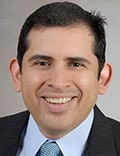Primary care practices continue to see a growing number of patients with diabetes, particularly in rural areas where rates of diabetes tend to be higher than in metropolitan areas. And for the most part, expert agree that’s the appropriate setting for those patients to receive care.
Many patients with diabetes can actually be managed by their primary care doctors, according to Absalon Gutierrez, MD, an endocrinologist with UTHealth Houston, Texas. That is, a type 2 diabetes diagnosis does not need to automatically trigger a referral to an endocrinologist.
“There’s no specific rule as to when to refer,” said Gutierrez.

Jay Shah, DO, a family medicine physician with Pomona Valley Hospital Medical Center in Chino Hills, California, agreed that it’s really up to the individual physician to decide if a patient could benefit from seeing an endocrinologist.
“We can refer to endocrinology at any time,” said Shah, noting that some physicians may choose to refer patients early after their diagnosis to an endocrinologist who specializes in diabetes management, whereas others might only refer more complex cases.
Uncontrolled Sugars
For some patients, there comes a time when they will benefit from seeing a diabetes specialist. Poor glycemic control is often the trigger for a referral to an endocrinologist. Gutierrez suggested that one such situation might be a patient who is taking three different medications and has made positive changes to their diet but still can’t get their diabetes under good control.
Some physicians say they will give a patient some time to improve — but only to a point.

Asha Shajahan, MD, a family medicine physician with Corewell Health Family Medicine in Roseville, Michigan, said she wouldn’t wait to make a referral if a patient presents with uncontrolled sugar levels in a higher range — 400 mg/dL or higher and an A1c level of 14 or 15. She might give a patient who presents with sugar levels in the 300s about 3 months to bring them down first. But if multiple attempts aren’t successful to bring down their blood glucose levels, she would recommend that they see an endocrinologist, too.

Sarah Tucker Marrison, MD, PhD, a primary care physician in Charleston, South Carolina, does not have a set time limit, but she lets two factors guide her. First, she monitors whether a patient’s A1c is improving over time, with adjustments. Second, she looks at trends that may indicate possible areas for improvement. For example, if a patient’s blood sugar is consistently elevated in the morning, she might adjust their insulin doses to address that. Without A1c improvements or a clear indication of an area in which improvements could be made, she would consider referring.
Another scenario that should probably trigger a referral to an endocrinologist: A patient is requiring increasingly larger doses of insulin, and they’re at greater risk for hypoglycemic episodes because intensive insulin therapy regimens are associated with higher rates of hypoglycemia.
Essentially, when cases become complex, that can be a good reason to consult an endocrinologist, said Betul Hatipoglu, MD, an endocrinologist and professor of medicine at Case Western Reserve University in Cleveland.

“Maybe it’s a good idea to say, ‘hey, can you look at this case and tell me what you think?’” said Hatipoglu.
Atypical cases are another possible reason to consult with an endocrinologist, she added. For example, you might have a case that looks like type 2 diabetes but the patient is young and does not have overweight or obesity, which opens up the possibility of early type 1 diabetes.
“If you are confused about the case or not sure, it might be a good idea to send them to a specialist,” she said.
Other Reasons to Refer
Because there’s not a standard set of guidelines for referral, many physicians have had to figure out what works best for them and their patients. However, they typically cite several types of patients that would likely persuade them to refer:
Patients with type 1 diabetes. Many physicians suggest that it’s appropriate to make sure that patients who are diagnosed with type 1 diabetes see an endocrinologist. Because patients with type 1 diabetes must use insulin, management can be more complex.
Patients using devices. Shajahan refers patients to endocrinologists if they need more help with an implanted device.
Marrison said that she does not manage insulin pumps in her practice at the present. “So if they have one already, I will go ahead and refer them out,” she said.
Additionally, if a patient expresses interest in using a pump, Marrison will arrange for them to see an endocrinologist to pursue that goal. She may eventually begin working with devices such as insulin pumps in the future, but for now, it’s better for her patients to work with an endocrinology practice with experience in both managing the devices and working with insurance companies to navigate insurance coverage.
Patients with multiple comorbidities. Like many primary care physicians, Shajahan cares for a significant number of patients with diabetes and multiple other comorbidities, including hypertension, depression, and cancer. It can be stressful to manage multiple chronic conditions in one 15-minute visit.
If she’s concerned that a patient gets easily distracted by other health concerns and can’t seem to focus on improving their diabetes management and struggles with blood sugar control, she might also consider referring them to a diabetes specialist.
“They need that focused, tailored care around their diabetes only,” she said.
Pediatric patients. About 352,000 people younger than 20 years in the United States have diabetes, and most of them — approximately 304,000 — have type 1 diabetes, according to the National Diabetes Statistics Report.
In addition to their need for careful monitoring for their diabetes and insulin use, children with type 1 diabetes seem to be at greater risk for other chronic comorbidities that may also require monitoring, such as thyroid disease, colitis, and cardiovascular disorders.
However, as more adolescents are diagnosed with type 2 diabetes, some physicians may feel more comfortable referring those patients to a diabetes specialist, too.
“We may refer to pediatric endocrinology for your younger population that are unfortunately being diagnosed with diabetes for better specialized care,” said Shah.
However, that may become more complicated in the future. A recent study of the pediatric endocrinologist workforce in Pediatrics suggested that the current workforce is already struggling to meet demand and may worsen — a significant problem, as the study suggested adult endocrinologists may not be appropriately equipped to meet this patient population’s needs.

